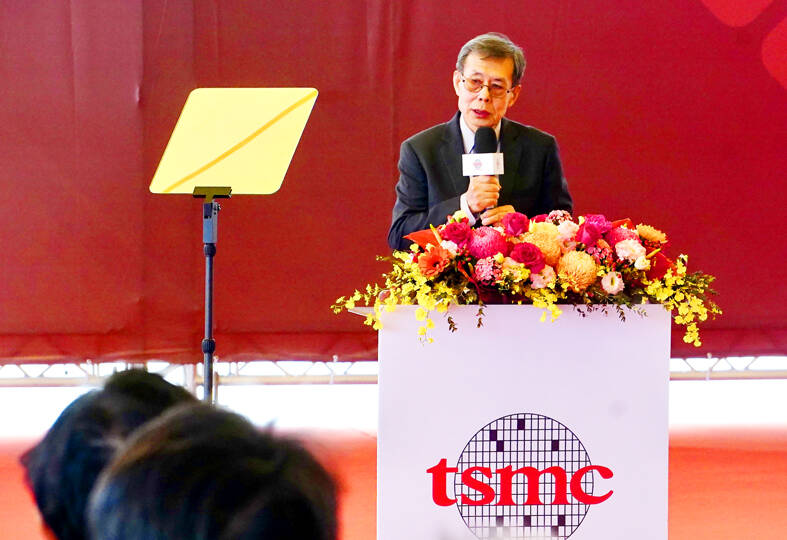Taiwan Semiconductor Manufacturing Co (TSMC, 台積電) yesterday said it is to invest a total of NT$1.5 trillion (US$45.2 billion) to expand its advanced 2-nanometer chip capacity in Kaohsiung, bolstering its commitment to augment investment and technology development at home.
The world’s biggest contract chipmaker unveiled the massive domestic investment after boosting its investment in the US by US$100 billion at the beginning of last month, fanning fears that Taiwan risks losing its competitive edge as TSMC plans to produce more advanced chips, including 2-nanometers, and set up a research and development center in the US for the first time.
TSMC yesterday held a capacity expansion ceremony at the construction site of its 2-nanometer fab, dubbed Fab 22, in Kaohsiung. The fab is to house five chip manufacturing facilities, with the first one set to enter volume production in the second half of this year, the company said in a statement.

Photo: CNA
“Today’s 2-nanometer capacity expansion ceremony holds significant importance for global semiconductor technology development, marking the successful progress of TSMC’s world-leading 2-nanometer process.
It showcases TSMC’s commitment to meeting strong market demand, continuously expanding capacity to support customers,” TSMC co-chief operating officer Y.P. Chyn (秦永沛) said at the ceremony.
“In Kaohsiung, we will have Phase 3, Phase 4 and Phase 5 wafer fabrication plants. All of them will germinate here,” Chyn said.
The chipmaker said it is currently installing equipment at the first phase of Fab 22 and has completed structural engineering works at Phase 2.
Government officials, including Premier Cho Jung-tai (卓榮泰), Kaohsiung Mayor Chen Chi-mai (陳其邁), Executive Yuan Secretary-General Kung Ming-hsin (龔明鑫) and Minister of Economic Affairs J.W. Kuo (郭智輝) attended the ceremony.
With NT$1.5 trillion in investment, Fab 22 would create more than 7,000 direct high-tech positions and 20,000 construction jobs, it said.
Aside from its revenue, TSMC generates about NT$3 trillion in production value a year and 500,000 jobs through its supply chain partners and related services, it said.
TSMC has also been holding intensive discussions with the authorities to acquire more land to build new chipmaking facilities, Chyn said.
The company said its 2-nanometer process technology is expected to be widely applied in customers’ next-generation leading technology products, including supercomputers, mobile devices and cloud-based data centers.
TSMC estimated that 2-nanometer technology would create end products with a market value of US$2 trillion within five years of volume production.
TSMC also has a 2-nanometer chip fab in Hsinchu, which is progressing as planned.
TSMC said almost all technology innovators in the world are closely collaborating with it to adopt 2-nanometer technology, given its 10 to 15 percent speed improvement and 25 to 30 percent lower power consumption compared with 3-nanometer technology.

SECURITY: As China is ‘reshaping’ Hong Kong’s population, Taiwan must raise the eligibility threshold for applications from Hong Kongers, Chiu Chui-cheng said When Hong Kong and Macau citizens apply for residency in Taiwan, it would be under a new category that includes a “national security observation period,” Mainland Affairs Council (MAC) Minister Chiu Chui-cheng (邱垂正) said yesterday. President William Lai (賴清德) on March 13 announced 17 strategies to counter China’s aggression toward Taiwan, including incorporating national security considerations into the review process for residency applications from Hong Kong and Macau citizens. The situation in Hong Kong is constantly changing, Chiu said to media yesterday on the sidelines of the Taipei Technology Run hosted by the Taipei Neihu Technology Park Development Association. With

A US Marine Corps regiment equipped with Naval Strike Missiles (NSM) is set to participate in the upcoming Balikatan 25 exercise in the Luzon Strait, marking the system’s first-ever deployment in the Philippines. US and Philippine officials have separately confirmed that the Navy Marine Expeditionary Ship Interdiction System (NMESIS) — the mobile launch platform for the Naval Strike Missile — would take part in the joint exercise. The missiles are being deployed to “a strategic first island chain chokepoint” in the waters between Taiwan proper and the Philippines, US-based Naval News reported. “The Luzon Strait and Bashi Channel represent a critical access

‘FORM OF PROTEST’: The German Institute Taipei said it was ‘shocked’ to see Nazi symbolism used in connection with political aims as it condemned the incident Sung Chien-liang (宋建樑), who led efforts to recall Democratic Progressive Party (DPP) Legislator Lee Kun-cheng (李坤城), was released on bail of NT$80,000 yesterday amid an outcry over a Nazi armband he wore to questioning the night before. Sung arrived at the New Taipei City District Prosecutors’ Office for questioning in a recall petition forgery case on Tuesday night wearing a red armband bearing a swastika, carrying a copy of Adolf Hitler’s Mein Kampf and giving a Nazi salute. Sung left the building at 1:15am without the armband and apparently covering the book with a coat. This is a serious international scandal and Chinese

COUNTERINTELLIGENCE TRAINING: The ministry said 87.5 percent of the apprehended Chinese agents were reported by service members they tried to lure into becoming spies Taiwanese organized crime, illegal money lenders, temples and civic groups are complicit in Beijing’s infiltration of the armed forces, the Ministry of National Defense (MND) said in a report yesterday. Retired service members who had been turned to Beijing’s cause mainly relied on those channels to infiltrate the Taiwanese military, according to the report to be submitted to lawmakers ahead of tomorrow’s hearing on Chinese espionage in the military. Chinese intelligence typically used blackmail, Internet-based communications, bribery or debts to loan sharks to leverage active service personnel to do its bidding, it said. China’s main goals are to collect intelligence, and develop a